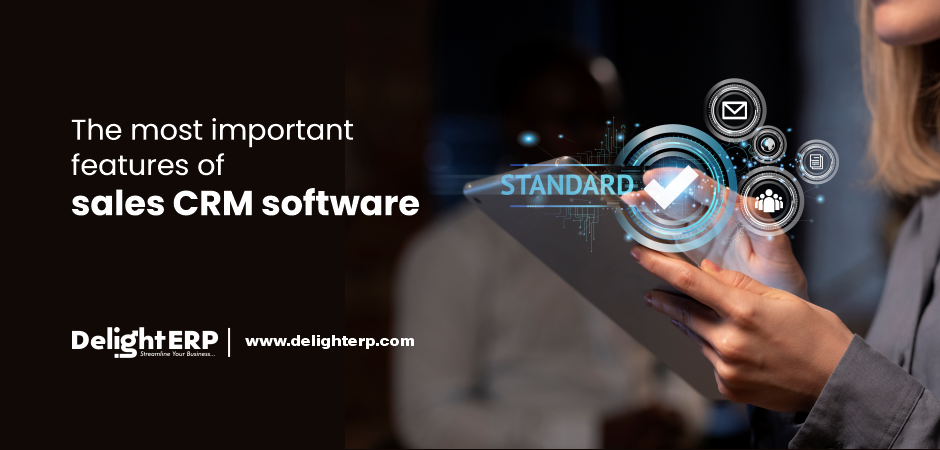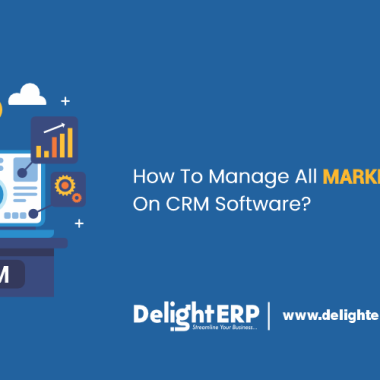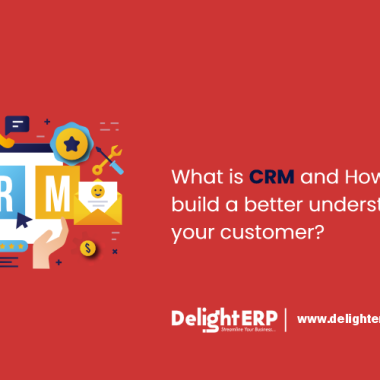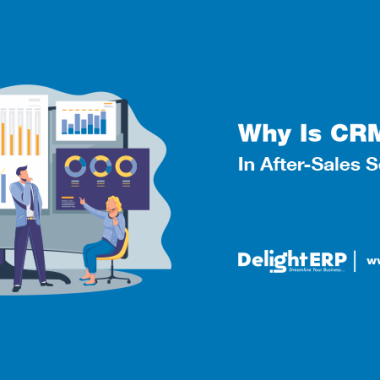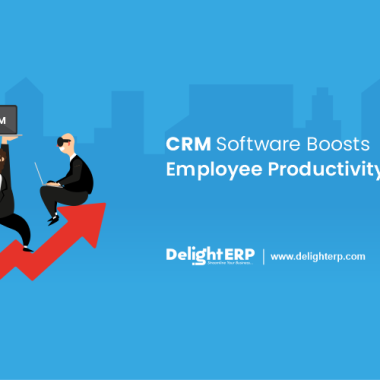Introduction
Customer Relationship Management (CRM) software has become an essential tool for businesses of all sizes, allowing them to manage their relationships with customers and prospects in a more organized and efficient way. Sales CRM software is a specific type of CRM that focuses on the sales process, from lead generation to deal closing. In this blog post, we will discuss the most important features of sales CRM software and how they can benefit your business.
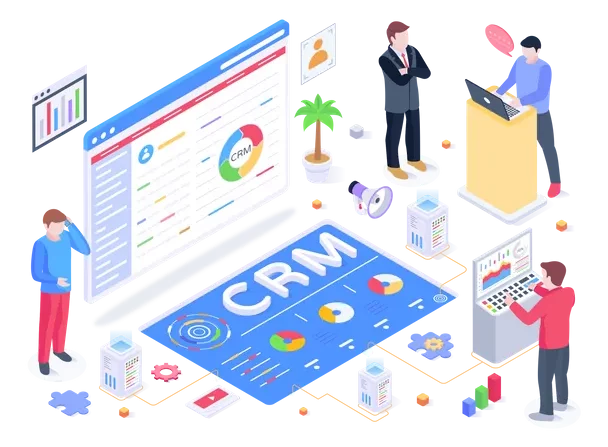
The most important features of sales CRM software:
1. Lead Management
The first and most important feature of any sales CRM software is lead management. The software should allow you to manage all your leads in one place, assign them to sales reps, and track their progress through the sales funnel. This will help you stay on top of your leads, follow up with them promptly, and ensure that none of them slip through the cracks.
2. Contact Management
Another important feature of sales CRM software is contact management. This allows you to store all your contacts in one place, including their contact information, communication history, and any other relevant details. Contact management helps you keep track of all your interactions with customers and prospects, allowing you to personalize your communications and build stronger relationships.
3. Sales Pipeline Management
Sales CRM software should also provide you with tools for managing your sales pipeline. This includes tracking the progress of deals, identifying bottlenecks, and forecasting sales revenue. With sales pipeline management, you can see which deals are likely to close and which ones need more attention, allowing you to prioritize your efforts and maximize your sales.
4. Sales Reporting
Sales reporting is another important feature of sales CRM software. It allows you to track your sales performance over time, analyze trends, and identify areas for improvement. Sales reports can also help you make data-driven decisions, such as which products or services to focus on or which sales reps to incentivize.
5. Sales Forecasting
A good CRM software should be able to provide accurate sales forecasting. It should help you to analyze your sales data and predict future sales.
6. Email Integration
Sales CRM software should also integrate with your email client, allowing you to send and receive emails directly from the CRM. This eliminates the need to switch between multiple tools and ensures that all your communications with customers and prospects are stored in one place. Email integration can also help you automate your sales outreach, such as sending follow-up emails or scheduling meetings.
7. Task Management
Sales CRM software should also provide tools for managing tasks and to-do lists. This allows you to stay organized and prioritize your work, ensuring that nothing falls through the cracks. Task management can also help you collaborate with other sales reps and track the progress of important projects.
8. Mobile Access
With the rise of remote work and mobile devices, sales CRM software must provide mobile access. This allows sales reps to access the CRM from anywhere, at any time, and stay on top of their leads and deals even when they’re on the go. Mobile access can also help sales reps respond to customer inquiries more quickly and close deals faster.
9. Employee tracking
CRM software is a great way to track employee activity and performance. Choose software that gives employees their accounts where they can individually track their hours, tasks, meetings, sales numbers, goals, and other items. The software should also give supervisors and upper management access to dashboards that let them view individual employee goals, completed tasks, and other metrics of productivity. This can help managers write employee performance reviews, create incentives, reward strong employees, identify those who are struggling, and address areas of improvement.
10. Integration with Other Tools
Sales CRM software should also integrate with other tools you use for sales and marketing, such as marketing automation software or social media management tools. This allows you to create a seamless workflow and eliminate the need for manual data entry or switching between multiple tools. Integration with other tools can also help you automate repetitive tasks and save time.
Connecting your CRM software to other solutions you already use can save you tons of time and money. Most CRM programs offer third-party software integrations; the key is choosing one that’s compatible with the software you use and easy to implement. For instance, popular CRM software Salesforce has its marketplace called AppExchange, where users can easily connect Salesforce to solutions such as QuickBooks accounting software, Mailchimp email marketing software, and DocuSign electronic signatures.
Here are a few things you can do with the right third-party integrations to make your life easier:
- Run CRM software straight from Outlook, Gmail, or other email clients so you don’t have to keep switching between apps.
- Automatically sync sales and order information with your POS system and accounting software to eliminate manual data entry.
- Automatically build email lists and launch email marketing campaigns from either your email marketing software or CRM software so you don’t have to open both.
- Back up and sync data with Dropbox, Box.com, and other popular cloud backup storage services.
Depending on your software, some integrations may require IT administration.
11. Customer service
CRM software can help you acquire and retain customers by providing excellent customer service. Look for the following capabilities that will allow your sales reps and customer support team to perform their best:
- Gives you a 360-degree comprehensive view of customers that shows everything there is to know about a customer from the first point of contact
- Automatically tracks all points of communications, from lead acquisition to closed sales and sales histories
- Logs all incidents, website visits, purchase histories, and other activities for future reference and to keep all reps on the same page
- Uses customers’ first names to personalize all correspondence
- Has unique reference numbers for each account, customer, and help issue
- Automatically sends customers acknowledgments of their inquiries and messages so they don’t feel ignored
- Supports premade email templates and call scripts that answer the most common questions
12. Customization
Finally, sales CRM software should be customizable to meet the specific needs of your business. This includes custom fields, workflows, and reports. Customization allows you to tailor the software to your unique sales process and ensure that it meets the needs of your team.
13. Workflow Automation
The software should have workflow automation features that help to streamline sales processes, reduce manual tasks and errors, and improve efficiency.
CRM software can make your life easier by automating your workflow. Look for software that lets you set up custom rules and comes with sales force automation to help you and your team be more productive.
By using rules, you can set your CRM software to automatically perform a specific action based on triggers or events, such as these:
- When a potential customer fills out a contact form on your website, the CRM software automatically directs the message to the right sales representative or department.
- When a sales representative receives a message, the CRM software automatically sends a preset response to acknowledge the message.
- If a lead, prospect, or opportunity doesn’t respond to your message or proposal, the CRM software automatically sends a follow-up message after a preset amount of time, such as 48 hours or two business days.
- When a sales representative makes calls or sends messages to a contact, the CRM software automatically logs hours and keeps track of all communications.
- As sales representatives complete tasks, the CRM software automatically reports them to supervisors and upper management for performance reports.
Workflow automation features can also take the time and legwork out of tedious sales tasks, such as order processing, order tracking, and inventory control.
14. Collaboration:
A good CRM software should allow team collaboration and communication, allowing your team to work together to close deals.
Conclusion
Sales CRM software is a must-have tool for any business that wants to improve its sales process and build stronger relationships with customers and prospects.
Delight Customer relationship management(CRM) is one of the different approaches that allow industries or businesses to manage their customers. Delight CRM is considered one of the most important and best software in which the company can invest.

